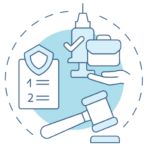NEW YORK (Reuters Health)—The recombinant shingles vaccine (RZV) is associated with an increased risk of gout flare, and a new study suggests other vaccines may trigger flares as well, researchers say.
“Our findings are novel because for the first time, we have identified a trigger for gout flares that presumably acts through [an inflammatory] pathway, as opposed to affecting serum urate levels, which previously had been thought of as the nearly exclusive mechanism behind gout flares,” Hyon Choi, MD, of Massachusetts General Hospital, Boston, tells Reuters Health by email.
Still, he says, “It is also important to keep in mind that the overall risk of gout flares after vaccination appears to be low, whether you look at the RZV data or the other vaccines that we present in our study.”
“The benefits of vaccinations on both individual and public health are overwhelming and cannot be emphasized enough,” he adds. “In particular, patients with gout often are older and/or have multiple comorbidities, constituting subpopulations who stand to benefit the most from routine adult vaccinations.”
“We are not advocating that patients with gout opt out of vaccines recommended by their doctors based on the findings of our study,” he says.
Dr. Choi and colleagues conducted an online case-crossover study of gout patients, collecting data on exposures to potential risk factors, including vaccinations, in two-day hazard periods prior to a gout flare and two-day control periods without a gout flare.
As reported online July 31 in Annals of Rheumatic Diseases, 517 participants (mean age 55; 79% men) experienced gout flares during follow up. Twenty-eight vaccinations occurred during 990 hazard periods and 21 during 1,407 control periods.1
After adjustment for covariates, vaccination was associated with twofold higher odds of gout flare (adjusted odds ratio, 1.99).
“Our findings suggest vaccines other than RZV are associated with increased odds of gout flares, potentially through a shared pathogenetic mechanism like NLRP3 inflammasome,” the authors state. “However, the absolute magnitude of increased odds of gout flares with vaccinations remains small and must be interpreted within the context of the overwhelming benefits of vaccinations.”
Dr. Choi adds, “Future studies could investigate the ability and potential utility of prophylactic anti-inflammatory medication use, such as colchicine, on mitigating the risk of gout flares associated with vaccination without compromising vaccine efficacy.”
Francis Luk, MD, assistant professor of rheumatology and immunology at Wake Forest Baptist Health in Winston-Salem, says in an email to Reuters Health that he has not noticed any relation between vaccination and gout flares in his practice.



